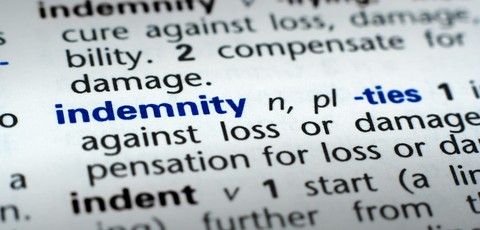In this blog post, Pramit Bhattacharya, a student of Damodaram Sanjivayya National Law University, writes about the concept of indemnity and agency. The post talks about the essentials of the contract of indemnity, the rights of the indemnity holder, and the indemnifier. The post also discusses the relation between agency and indemnity.
Indemnity can be considered as a sub-species of compensation. And therefore, a contract of indemnity deals with compensation in cases of contracts. The responsibility to indemnify is taken voluntarily by the indemnifier, and even the mere possibility of occurrence of a loss will make him liable. The loss should arise due the conduct of the indemnifier or any third party. A contract of indemnity should also have the essential elements of a contract like free consent, legality, etc. So in the case of indemnity, the promisor is under the obligation to save the promisee from any kind of loss due to the promisor’s own conduct or conduct of any other party.
In the case of an agency, the principle that one person cannot carry out all transactions all alone, so he should have an opportunity to facilitate his business wherein he is represented by another person when dealing with a third person.
Concept of Indemnity
In general, indemnity can be defined as “protection against losses.” Indemnity is a protection or security against a loss. Contract of Indemnity is governed by Section 124 of the Indian Contract Act, 1872,[1] which falls under Chapter VIII of the Act. Under this Section, the definition of a contract of indemnity is given as a contract “by which one party promises to save the other from loss caused to him by the contract of the promisor himself, or by the conduct of any other person, is called a “contract of indemnity.”
Essentials
There must be two parties and, there should be an agreement between them wherein the promisor promises to save the promisee from any kind of loss. This is the most vital element in the contract of indemnity. The loss occurring may be due to the conduct of the promisor or any other third party. The provisions of the Act restrict the loss to an extent because it is restricted to a human agency only and an act of God is not covered under the contract of indemnity. Marine Insurance, fire insurance, etc. also fall into the category of the contract of indemnity.[2]
Rights of Indemnity Holder
Section 125 of the Act governs the rights of the indemnity holder.
- The indemnity holder will have the right to recover any amount he was compelled to pay in a matter or a suit to which the promise of the indemnifier applies. For instance, A and B enter into a contract that A will indemnify B if C sues B in a particular matter. Now, C sues B and B had to make some payment. According to the contract, A will have to make good all the payment which B made to C in relation to that matter.
- The indemnity holder is also entitled to recover any cost which he might have to pay to any third party. But the indemnity holder should have acted prudently and under the directions which were given by the indemnifier. In the judicial pronouncement of Adamson v Jarvis,[3] Adamson was an auctioneer and under the instruction from Jarvis he auctioned some cattle. It was later known that Jarvis wasn’t the real owner of the cattle. The real owner of the cattle filed a suit against Adamson. The Court held that Adamson could recover the cost he incurred from Jarvis because he acted as per the instructions given by Jarvis.
- The indemnity holder also has the right to recover nay sum that he may have paid under any suit or compromise provided it was not contrary to the instructions of the indemnifier.
Rights of the Indemnifier
Although the rights of the indemnity-holder have been mentioned under the Act, the rights of the indemnifier haven’t been mentioned expressly under the Act. In the judicial pronouncement of Jaswant Singh v. Section of State,[4] it was opined by the Court that the rights of the indemnifier are similar to the rights of a surety. Rights of a surety have been stated under Section 141 of the Act. The indemnifier, upon indemnification, will be entitled to all the protection which the indemnified person was entitled to. The principle of subrogation comes into play here. The principle of subrogation follows the principle of substitution. Once the promisor pays the amount of compensation, he replaces the indemnified person.
Enforceability of Contract of Indemnity
In India, no provision expressly states that when a contract of indemnity will become enforceable. The judicial decisions are also conflicting with respect to the issue of enforceability. The case of O.J. and Sons Ltd. v. Gopal Purushottam[5] is one of the earliest cases in India where the right to be indemnified before paying was recognized. But the trend and the Courts have changed a bit. In the cases of Gajanand Moreshwar,[6]Shiam Lal v. Abdul Salal,[7] and K. Bhattacharya v. Namo Kumar,[8] the Court was of the opinion that the indemnified party can compel the indemnifier to pay so that he can meet a liability without waiting to actually discharge the liability. The principle followed is that the indemnified party shall never be called to pay. The obligation of the indemnifier starts as soon the loss becomes absolute.
Contract of Agency
In the case of a contract of agency, one person represents some other person when dealing with third prties and transacting with them. The person who authorizes someone else to work on his behalf or represent him is known as the principal. The party who has been authorized is known as the agent. The relationship that subsists between them is known as an agency. In the case of an agency, the principle has to give his express or implied authority to represent him and carry on the activities on his behalf. But an agency can be created through estoppel or ratification also. In a case of an agency by estoppel, the third party may be lead to believe that one person is acting on the behalf of the other, because of the conduct of the parties. In the case of an agency by ratification, one party does not have the authority to represent the other when entering into a contract with a third party or carrying on any activity. But the transaction is adopted by the principal later. This is known as ratification. In the case of an agency, no consideration is needed to be paid. It is not necessary to pay some remuneration or commission, and the principal will be held responsible for the acts of the agent even when no remuneration is paid to the agent. The agent must work according to the instructions of the principal. A fiduciary relationship exists between the agent and the principal, i.e. of trust and confidence. The principal has the duty to reimburse the agent for his expenses, and he must also indemnify the agent against any kind of loss which has been incurred while carrying out the agency business.
Indemnity and Agency
Under Section 222 of the Indian Contracts Act, it is stated that the agent must be indemnified for the activities which have been carried out lawfully on the behalf of the principal. For instance, X, an agent, who is in Spain gets the instruction from Y, the principal, who is in India to enter into a contract with Z and deliver certain goods to Z. Subsequently, Y does not send any goods to X, and the contract is breached because X couldn’t deliver them to Z. Z sues X for the breach. X informs the principal about the suit and the principal authorizes the agent to defend the suit. The agent incurred certain expenses to defend the suit. Y, as the principal will have to indemnify the agent. Another example can be given to define the principle. A, the principal asks B, the agent, to enter into a contract with C and buy 100 sacks of rice. Later A refuses to take the delivery of the sacks. C sues B for the damages and B had to compensate C. A is under an obligation to indemnify B for the damages he suffered.
The case of Adamson v. Jarvis[9] mentioned earlier can also be a classic example of indemnity in case of an agency. The auctioneer sold the cattle under the instruction of Jarvis. But Jarvis was not the true owner of the cattle. Adamson had to pay the damages to the real owner. But as an agent who was working lawfully on the instructions of the principal, he was entitled to be indemnified.
Concluding Remarks
Simply put, in the contract of indemnity one party needs to make good any damage or loss suffered by the other party due to the conduct of the promisor or any third party. Having a simple indemnity clause in a contract would not always answer liability issues because the law does not encourage those who try to shift their own liability onto other or seek to avoid liability. The main reason behind this is that the negligent party shouldn’t be allowed to shift all the liability on another party.
Footnotes:
[1]http://comtax.up.nic.in/Miscellaneous%20Act/the-indian-contract-act-1872.pdf
[2]http://informationbible.com/article-essentials-and-legal-rules-for-a-valid-contract-of-indemnity-181150.html
[3](1827) 4 Bing 66: 5 LJ (os) (CP) 68: 29 RR 503.
[4]14 BOM 299
[5] [1728] ILR 56 CAL 262.
[6]A.I.R. 1942 Bom, 302, at 304.
[7]1931 ALL 754
[8]1899 26 CAL 241.
[9] Supra 3
 Serato DJ Crack 2025Serato DJ PRO Crack
Serato DJ Crack 2025Serato DJ PRO Crack












 Allow notifications
Allow notifications


